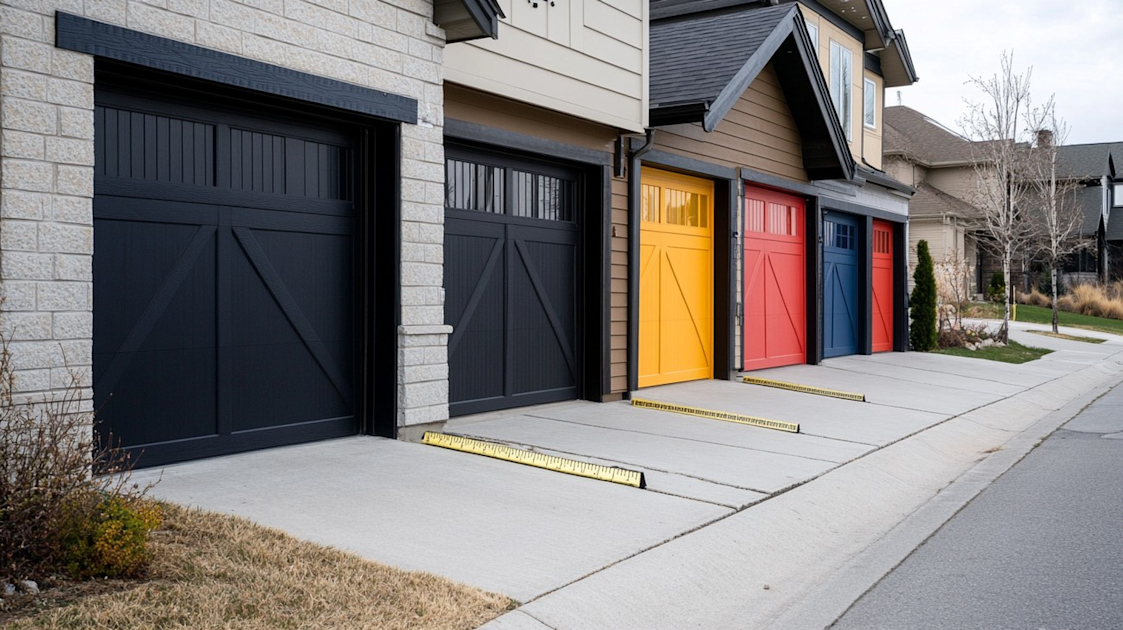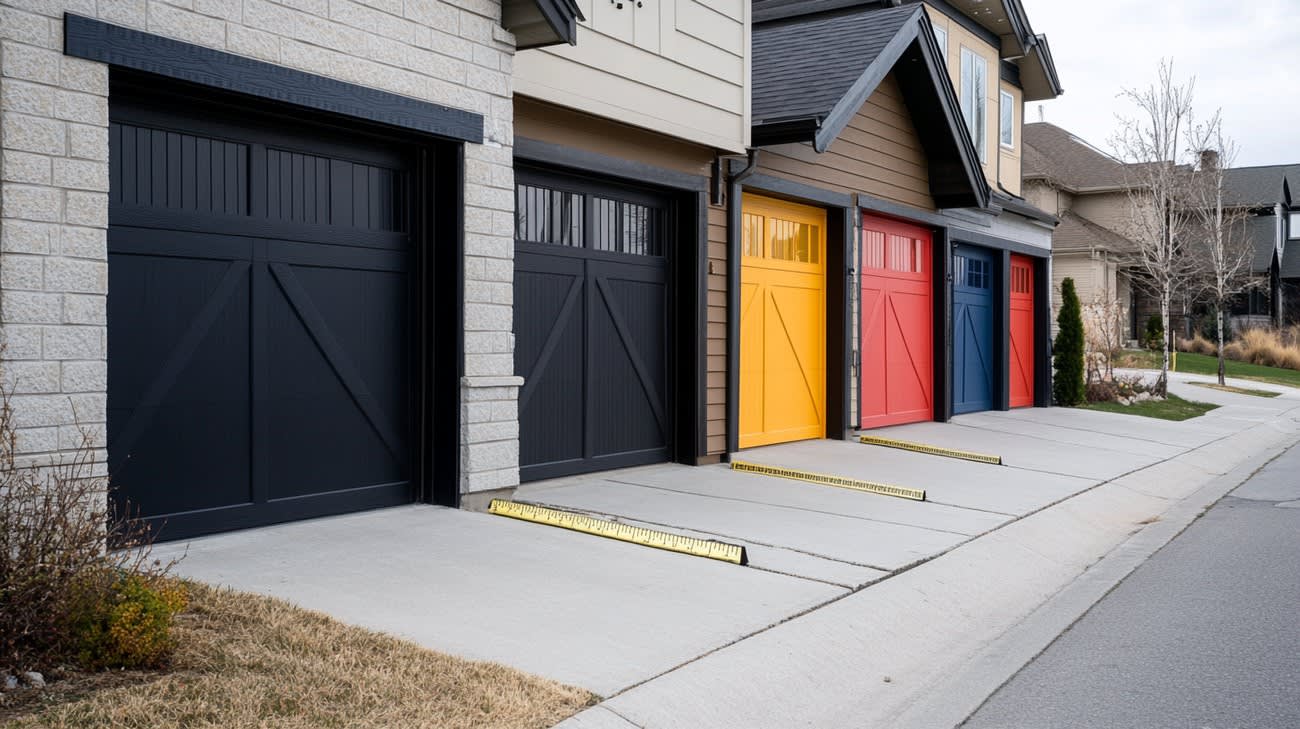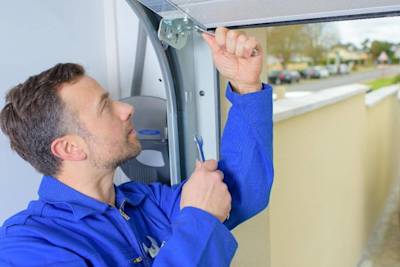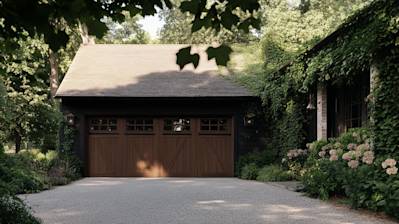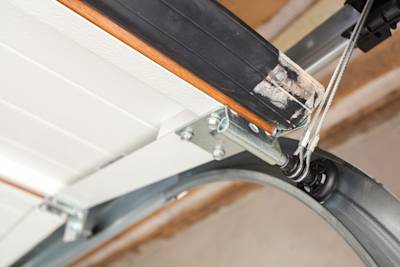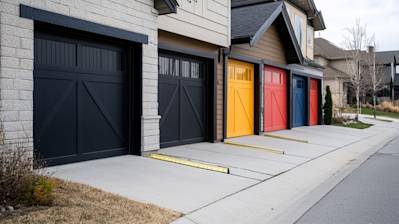Whatever the type of your vehicle; be it a family sedan or a luxurious SUV, your garage door should be adequate enough to let your vehicle pass without any scratches. And that's where the concept of 'standard garage door sizes' comes to play. Let's dive deeper into this subject to understand its importance during the construction or renovation of our houses.
A Sweeping Overview of Garage Door Sizes
The size of a garage door depends broadly on the use it's intended for. A single car garage door normally measures 8 to 9 feet in width and 7 to 8 feet in height. A two-car garage door, on the other hand, has a width of 12 to 16 feet. For recreational vehicles (RVs), the garage needs to be much larger, usually having a width from 16 to 20 feet. It's essential to understand that these are 'standard' sizes and that the actual size can vary depending on the user's needs.
Single-Car Garage Door Sizes
Let's break down the sizes:
- Standard Size: A typical single-car garage door measures 8 or 9 feet wide and 7 or 8 feet high. These dimensions should be sufficient to accommodate most interstate passenger vehicles such as sedans and small SUVs.
- Oversize Doors: For larger vehicles, oversized garage doors come into play. They usually measure around 10 feet in width. Thus providing some extra space for the vehicle to enter and exit the garage smoothly.
Double-Car Garage Door Sizes
For homes that need to accommodate multiple cars, we rely on something larger. Here’s a glimpse into the popular sizes:
- Standard Size: A standard double-car garage door normally measures 12-16 feet wide and 7-8 feet high. This size is large enough to comfortably house two normal-sized cars side by side.
- Oversize Doors: Larger vehicles, or situations where additional storage or workspace is needed, may require an oversized garage door. These can range from 18 to 20 feet in width.
RV Garage Door Sizes
For the travel enthusiasts who own an RV, a standard garage door won't suffice. The sizes generally required are:
- A width of 16 feet
- A height of at least 8 feet, and
- An extra 5-6 feet of length for accommodating the full length of an RV.
These are rough estimates, as the actual size of an RV garage door can depend upon the particular model of the RV.
Custom Garage Door Sizes
Although there are standard sizes for garage doors, that doesn't mean your choices are limited to these dimensions. Garage door sizes can be customized to suit your particular needs, whether that's an extra-large size to accommodate recreation vehicles or a smaller size to fit a compact urban garage space.
Understanding Other Factors
Apart from the size of the vehicle, there are other factors as well that impact the size of a garage door like:
- Storage: Those who utilize their garage for storage might need additional space. Thus, a larger size can accommodate shelving or storage units.
- Workspace: If you plan to use your garage as a workshop, you might need more room.
- Walkway: Ensuring a little extra space for moving around can prove to be beneficial.
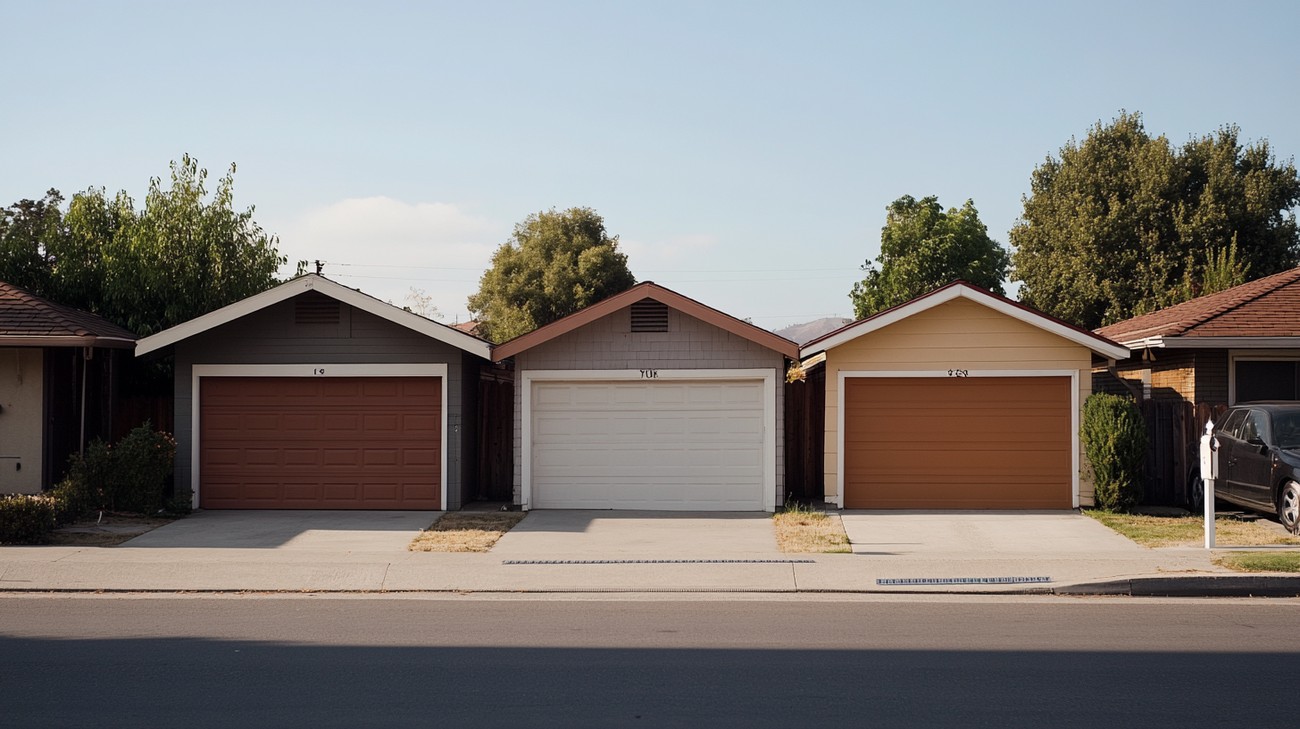
Frequently Asked Questions about Standard Garage Door Sizes
Are there different types of standard garage door sizes?
Absolutely! Standard garage door sizes vary on the type of vehicle and the quantity it needs to accommodate. For instance, a single door garage size generally suits one small to a medium-sized car. Meanwhile, a double door garage size, which is typically double the width of a single door, can accommodate larger or multiple vehicles.
What are the measurements for standard single garage door sizes?
Single garage door sizes traditionally come in three sizes - 8 x 7 feet, 9 x 7 feet, and 10 x 7 feet. Bear in mind that these measurements are all in width x height.
What are the measurements for standard double garage doors sizes?
Standard sizes for double garage doors usually come in four sizes: 12 x 7 feet, 14 x 7 feet, 16 x 7 feet, and 18 x 7 feet. As we previously discussed, these double size doors are perfect for larger vehicles or multiple vehicles.
Are these standard garage door sizes applicable across all states?
While these dimensions are considered standard, there might be slight variations depending on the locality and builder. For instance, certain areas might have a higher prevalence of larger vehicles, translating to more double size doors. Therefore, it's always a good idea to check local regulations and standards.
Do all manufacturers use these standard garage door sizes?
Most manufacturers adhere to these standard measurements to ease installation and user compatibility. However, it's important to remember that manufacturers also offer custom-made doors to accommodate specific design specifications or unique requirements.
How do the standard garage door sizes affect the installation process?
Garage door sizes can greatly impact installation. Standard sizes make the process easier as the builder often accommodates these measurements in the home's structure. However, if you choose a non-standard door, this could complicate installation and might require custom work to your house's frame.
What garage door size would suit an RV?
RVs require larger doors due to their height. The usual door sizes for an RV could range from 16 feet wide and 8 feet high, but depending on the RV size, doors can be as large as 20 feet wide and 14 feet high.
Can I request a custom garage door size?
Indeed, you can. While using standard garage door sizes simplifies the process and is often more cost-effective, custom sizes are entirely possible. It’s common for homeowners with distinct aesthetic or space requirements to opt for custom sizes.

Pros of Standard Garage Door Sizes
Easy Installation
Time Efficiency
Standard garage door sizes are pre-engineered, which makes them relatively easy to install. When you opt for these sizes, you save lots of time because the installation process is fairly straightforward. The necessary measurements are already predetermined, eliminating the need for extensive customization that may take more time to get precisely right.
Universally Recognized Measurements
Since these measurements are universally recognized, it's easy for contractors and homeowners to understand and work with them. This convenience eliminates the possibility of errors during installation due to miscommunication or misunderstanding.
Cost-Effective
Lower Pricing
Standard garage door sizes are usually less expensive than custom sizes. The mass production of these standard sizes leads to economies of scale, making the costs per unit lower.
Wide Availability
The wide availability of standard sizes also contributes to their cost-effective nature. You can find them in most hardware stores or online platforms, and they usually don't require special ordering or shipping consideration that could add to the cost.
Large Variety of Styles and Designs
Broad Selection
Standard garage door sizes come in a large variety of styles, designs, and materials. Whether you are looking for wood, steel, or fiberglass doors, they're all available in these sizes. They also come in different styles, from traditional to contemporary designs, to match the aesthetic of almost any home.
Easily Accessible Designs
Since these doors are quite common, getting the design and style that you desire is typically hassle-free. Do you want a garage door with windows or without? Do you prefer a solid door or one with decorative elements? All of these options are readily available in standard garage door sizes.
Cons of Standard Garage Door Sizes
Limited Personalization
Predictable Look
With standard garage door sizes, there’s a limit to the amount of personalization or distinctiveness you can achieve. If you don't want your garage door to look like many others in your neighborhood, a standard size might not offer the uniqueness you desire.
Non-standard Architecture Challenges
Additionally, if your home has non-standard architecture or design features that you want your garage door to complement or match, you won't be able to achieve this with standard sizes.
Size Restrictions
Not Suitable for Oversized Vehicles
One of the biggest limitations to standard garage door sizes is that they may not accommodate all vehicle sizes. If you have oversized vehicles, like RVs, boats or large trucks, a standard garage door might not offer the clearance you need.
Inflexibility for Future Changes
Moreover, if you’re thinking about future upgrades like getting larger vehicles, standard garage doors will limit your options. You will have to consider reconstructing your garage door, which could potentially lead to significant costs.
Contribution to Generic Neighborhood Appearance
Lack of Individuality
Standard garage door sizes are very common, which may contribute to a generic, matchy-matchy neighborhood appearance. If you are looking to stand out or to add individuality to your home, garage doors of standard sizes may not be the best option for you.
Potential Home Value Implications
Some real estate experts argue that customized homes often yield a higher property value compared to standard ones. Therefore, opting for a standard garage door size could possibly affect your home's value negatively.
In summary, while standard garage door sizes offer easy installation, cost-effectiveness, and versatile style options, they may also limit personalization, restrict size options, and contribute to a generic neighborhood appearance. Factors such as your budget, aesthetic preferences, vehicle size, and future needs will determine whether or not this option suits your needs.

Myths and Misconceptions about Standard Garage Door Sizes
The world of garage doors is surprisingly vast and filled with varied myths and misconceptions. Having misunderstandings about garage door sizes can lead to incorrect purchasing decisions, causing inconvenience and possibly financial loss. Let's get to know some of these misconceptions in detail.
Myth 1: Standard Door Sizes Fit Any Garage
Misconception
It's a common belief that standard garage door sizes are universally adaptable. Many people think that one can easily buy a "standard" garage door size and fit it into any garage, saving time and effort on customization.
Reality
While there are certainly "standard" sizes, such as 8x7 feet, 9x7 feet, and 10x7 feet for single car garages, and 16x7 feet or 18x7 feet for double car garages, these may not suit all garages perfectly. Every garage is unique, and its measurements depend on various factors like the car size it accommodates, house structure, homeowner preferences, etc. Always measure your garage door opening before purchasing the door.
Myth 2: Custom Garage Door Sizes are Unnecessary and Expensive
Misconception
There's an idea that custom garage doors are luxuries, rather unwarranted, and expensive to boot - that customization is all about aesthetics and not function.
Reality
Custom garage door sizes are often necessary due to unique garage dimensions, non-standard architecture, or specific safety requirements. Further, customization doesn't always mean overspending - in some cases, it might even save you money by ensuring a perfect fit and improving energy efficiency.
Myth 3: All Double Garage Doors are the Same Size
Misconception
It's generally presumed that if a garage can accommodate two cars, any "double" garage door will fit - that all double garage doors come in a universal 'double' size.
Reality
Like single garage doors, double garage doors also come in different sizes. The most common dimensions for double garage doors are 16x7 feet and 18x7 feet, depending on the garage's width. Always check your garage's dimensions before buying a double garage door.
Myth 4: Garage Door Thickness Doesn't Affect the Size
Misconception
Many believe that the door's thickness has no relevance in deciding the 'size' of the garage door - that size is all about length and width.
Reality
While length and width are undoubtedly crucial, thickness also plays a part, especially in relation to insulation and durability. Thicker doors often offer superior insulation and are more robust, so thickness can indeed influence the size specification based on your needs.
Myth 5: Bigger Garages Require Bigger (Taller) Garage Doors
Misconception
The myth here is that the bigger your garage is, the taller the garage door needs to be. Some believe that a larger garage equates to a need for larger vehicles, thus requiring taller doors.
Reality
The size of the garage door required depends on the type of vehicles to be stored and not on the garage's size itself. SUVs, trucks, and vans might require taller doors, whereas smaller garages or those for compact cars won't require exceptionally high doors.
Myth 6: Garage Door Sizes Don't Affect House Value
Misconception
Another common myth is that the size of your garage door doesn't impact your property's value.
Reality
The size and style of your garage door can considerably affect your house's curb appeal and hence, its market value. Furthermore, the energy efficiency gained through a well-insulated and precisely fitting garage door can also enhance your property’s value. Choosing the right garage door size is as much about practicality as it is about aesthetics.
Summary
So, taking all that into account, we've gathered a bunch of useful data about standard garage door sizes. Whether you're buying for residential or commercial purposes, it'll really come in handy. Size matters when choosing the right garage door. Not only does it have to accommodate your car, but the garage door needs to fit within the architectural design of your home or business.
The beauty of "standard garage door sizes" means that there's likely a readily available and suitable option for almost everyone, making it an easier and quicker process for you. These options provide functionality and even add aesthetic appeal. The trick lies in picking the right standard size to meet your needs.
Lastly, it's worth noting that while these standard sizes are the most common, you can opt for custom sizes. If you have a larger or unusually sized vehicle, or your garage has unique measurements, you can always get custom size garage doors. However, remember that custom sizes may be pricier than standard ones, but with them, you can get a garage door that's just right for your needs.
About 1A Garage Doors
At 1A Garage Doors of Sacramento, CA, we're more than just your average garage door company. We're a family-owned business with an unwavering commitment to the highest quality services and customer satisfaction. You see, for us, it's not just about fixing garage doors, it's about making sure our neighbors and community members feel safe and secure with sturdy, reliable garage doors. We offer a range of services, from installation to repair, and we focus on using only the highest quality parts. With more than a decade of experience, we're not just experts in what we do - we're also deeply passionate about it. Get in touch to see the 1A difference.

